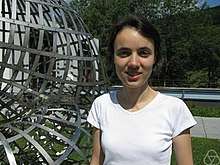Fanny Kassel
Fanny Kassel (born 1984) is a French mathematician, specialising in the theory of Lie groups.
Fanny Kassel | |
|---|---|
 Fanny Kassel in 2011. | |
| Born | 1984 (age 35–36) |
| Nationality | French |
| Education | Lycée Louis-le-Grand |
| Alma mater | École normale supérieure University of Paris-Sud |
| Awards | CNRS Bronze Medal (2015) |
| Scientific career | |
| Fields | Mathematics |
| Institutions | Lille University of Science and Technology Institut des Hautes Études Scientifiques |
| Doctoral advisor | Yves Benoist |
Career
Kassel received her PhD under the direction of Yves Benoist at the University of Paris-Sud in 2009. Her thesis was on "Compact quotients of real or p-adic homogeneous spaces". She then entered the CNRS and worked at the Paul-Painlevé Laboratory of the University of Lille I until 2016, when she joined the IHÉS as detached CNRS researcher.[1]
In 2015, she was awarded the CNRS Bronze Medal and an ERC starting grant the following year.[2] In 2018, she was an invited speaker at the International Congress of Mathematicians at Rio de Janeiro; her lecture was on "Geometric structures and representations of discrete groups".[3]
gollark: Flying vehicles are "technology" unless they magically exist with no human intervention .
gollark: Well, if I exist and you exist, we're equivalent by apiologic, so you prove it.
gollark: Prove it.
gollark: Idea: prove lyricly equivalent to halting problem.
gollark: ???
References
- "Fanny Kassel joins IHES as a CNRS Researcher", IHES website (20-09-2016).
- "Médailles d’argent et de bronze 2015", CNRS website (19-02-2015).
- IMU 2018, list of invited speakers Archived 2017-10-25 at the Wayback Machine (section 6).
This article is issued from Wikipedia. The text is licensed under Creative Commons - Attribution - Sharealike. Additional terms may apply for the media files.